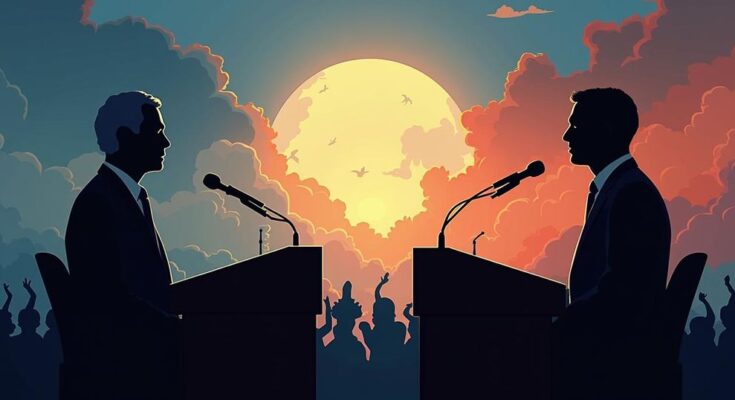Senator JD Vance of Ohio and Governor Tim Walz of Minnesota faced off in their first vice presidential debate on October 1, 2023, addressing significant issues such as the Middle East conflict, climate change, and immigration policies. While Walz criticized Trump-era policies for lacking leadership, Vance defended the previous administration’s record on stability and called for a strong approach to immigration and climate resilience. The debate was moderated under strict rules to ensure a fair and focused discussion.
On October 1, 2023, as the elections approach, the first and only vice presidential debate featured Republican Senator JD Vance of Ohio and Democratic Governor Tim Walz of Minnesota. The debate commenced with a handshake and immediately delved into pressing national issues, including the situation in the Middle East, climate change, and immigration policies. The candidates were first questioned about current crises, particularly the conflict in the Middle East, where Governor Walz emphasized the need for “steady leadership” in light of escalating threats. He criticized former President Donald Trump’s approach, suggesting it lacked the necessary gravitas during such turbulent times: “It’s clear… a nearly 80-year-old Donald Trump talking about crowd sizes is not what we need in this moment.” Senator Vance countered Walz’s assertions, highlighting Trump’s previous role in maintaining stability globally. He pointed to significant financial resources that Iran has acquired under the current administration, asserting that these funds have been redirected to bolster military aggression: “Iran… has received over $100 billion in unfrozen assets, thanks to the Kamala Harris administration.” The discourse pivoted to climate change with the backdrop of Hurricane Helene, a storm that has claimed lives and left many missing. Senator Vance extended condolences to those affected by the disaster, asserting that a future Trump administration would prioritize American citizens’ needs. He reiterated support for clean air and water but challenged Democrats’ focus on carbon emissions: “If that’s true, then you’d want to reshore as much American manufacturing as possible…” In contrast, Governor Walz presented climate change as an urgent and accelerating crisis, rebutting Vance’s claims that Trump dismissed it as a “hoax.” He defended the Biden administration’s efforts through the Inflation Reduction Act, which he claimed represents unprecedented investment in combatting the climate challenge: “We are producing more natural gas and oil at any time than we ever have… We’re also producing more clean energy.” The debate also addressed immigration, wherein Vance critiqued the Biden administration’s policies, which he argues have exacerbated border issues and facilitated the influx of illicit substances, particularly fentanyl: “You’ve got to stop the bleeding… reimplement deportations.” Both candidates recognize the significance of the Midwest in the upcoming election, with the contest focusing on pivotal swing states such as Pennsylvania, North Carolina, and Georgia. As the evening unfolded, moderators Norah O’Donnell and Margaret Brennan guided the debate, specifying rules that ensured a fair discussion, including restrictions on using notes or props and an equal allocation of time for responses and rebuttals.
The vice presidential debate on October 1, 2023, is a critical component of the electoral process in the United States, especially as national tension regarding the Middle East and climate change intensifies. This debate provides insight into the candidates’ perspectives on key issues that have implications for both domestic and foreign policy. As Republican and Democratic representatives, Vance and Walz aim to clarify their party’s stances and engage on matters such as immigration reform, environmental policies, and security strategies that will resonate with voters in swing states critical for victory in the upcoming election.
The debate between Senator JD Vance and Governor Tim Walz underscored stark contrasts in their approaches to pivotal issues facing the nation today, such as the conflict in the Middle East, climate change, and immigration reform. As the election day approaches, their positions will likely influence voter sentiments, particularly within key battleground states. The nature of this debate exemplifies the current political landscape and the significant challenges that both candidates aim to address in their campaigns.
Original Source: www.upi.com




